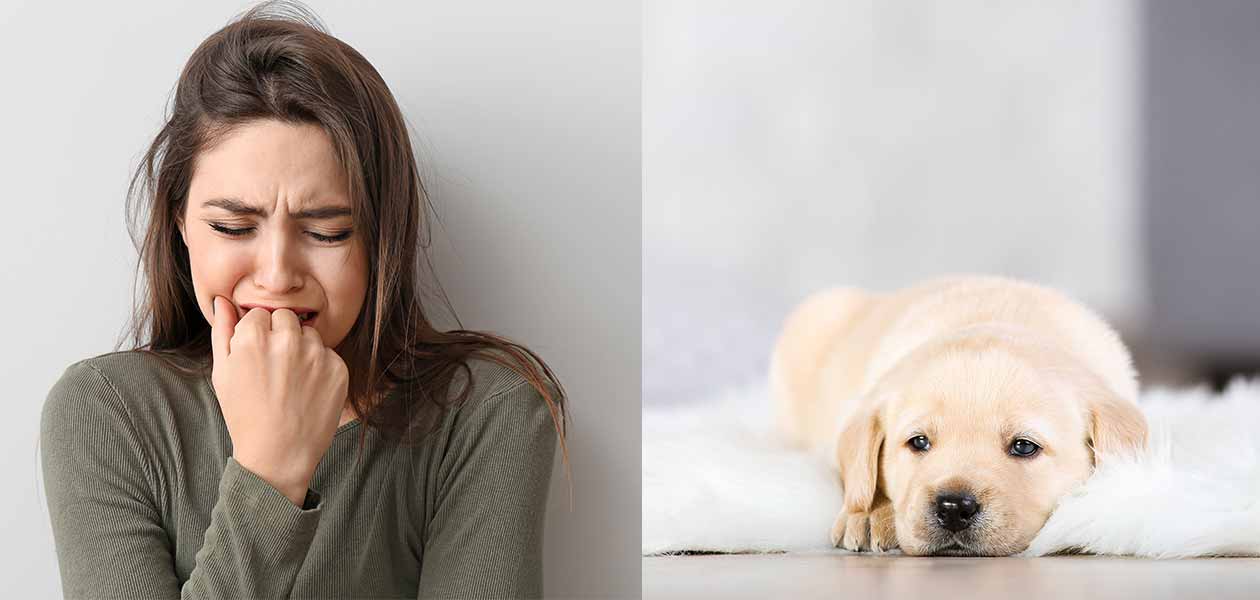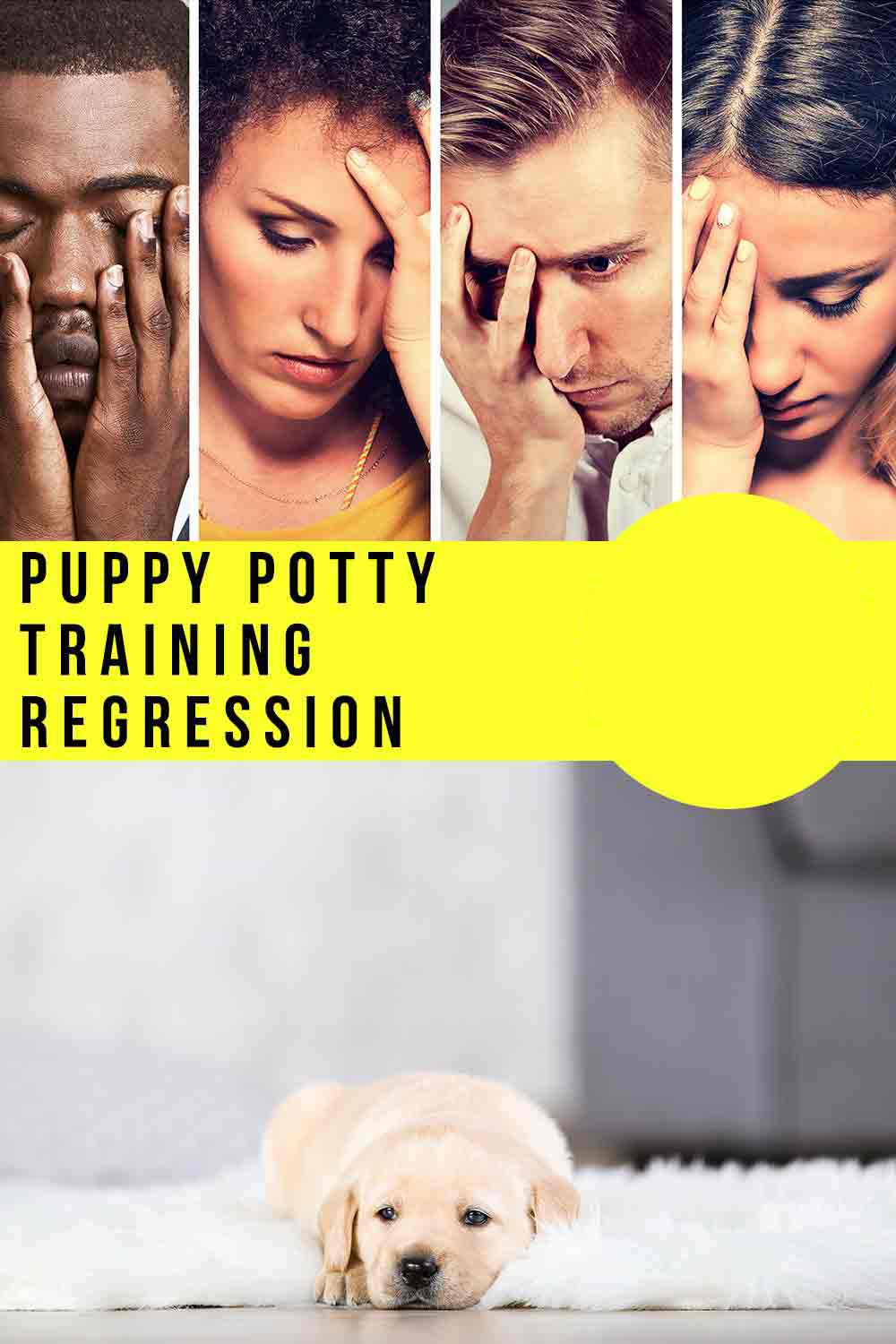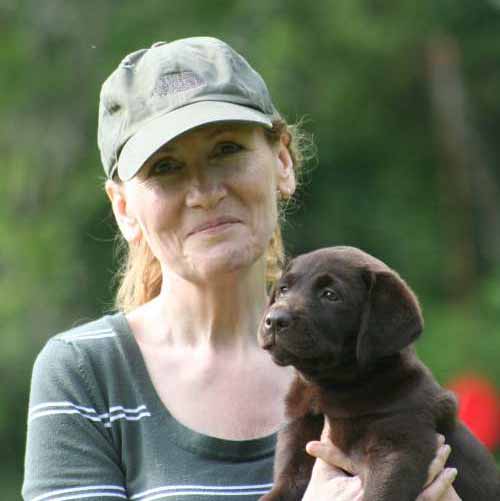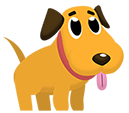 Puppy potty training regression sucks, but it’s not usually as bad as you think.
Puppy potty training regression sucks, but it’s not usually as bad as you think.
In fact, for the most part it’s just a sign that you’ve missed a step somewhere along the potty training process.
And that can be fixed by looking at where you might have made an assumption, or pushed too far too fast.
You think you’ve cracked it….
Your puppy is fully potty trained at three months old! Amazing! The world is your oyster!
But then… a few days, or even weeks later, disaster strikes.
Your puppy is trotting happily around indoors, treading little pads of pee wherever he walks.
So what went wrong?
How did your puppy regress so badly in their potty training all of a sudden?
Puppy potty training regression
Puppy potty training is the term we use to explain the process of teaching our dog to pee and poop outdoors.
When our puppy can hold her bladder for a significant period of time indoors, or ask to go outside when she needs to, we consider her potty trained.
Regression is a psychological term, used to describe a return to an earlier state of development.
When we talk about it in terms of house training a dog, we mean that they’ve gone back a stage to when they weren’t potty trained as well, or at all.
But, puppy potty training regression isn’t always the right term.
If it’s not puppy potty training regression, what is it….
It might sound infuriating, but it’s easy to mistakenly think your puppy is potty trained when they are not.
Some breeders even advertise 8 week old puppies as potty trained.
But no tiny puppy is truly clean in the house at this stage of their development. What has happened is that the way they have been managed has given this impression.
Whether that’s because the puppy had constant access to the outdoors, or because they were let out at lots of regular intervals so accidents never happened.
So why did your puppy seem to be trained?
Possible reasons for puppy potty training regression
There are things that trick you into thinking your puppy is clean in the house, when they aren’t.
And they aren’t all bad things, and if you’ve managed to not have any accidents indoors up to this point then that’s a great basis for future potty training.
But it’s important to recognize that your puppy isn’t going backwards, they just haven’t got there yet.

Here are the factors that can cause your puppy potty training to appear to regress:
- Access
- Bladder control
- Bladder capacity
- Meal timings and sizes
- Over crating
- Unreasonable expectations
Access
Do you like to keep the door to the backyard open in warm weather? Has it recently got cold and the door has been shut?
Or has it started raining a lot recently?
Puppies that are used to being able to trot outside to use the bathroom whenever they need to are quick to potty train.
Or they certainly seem to be.
But often they aren’t actually learning to hold their bladder, or bowels, at all. They are simply accessing their chosen bathroom place as soon as they need it.
And when you remove access to that bathroom, they find another one that they aren’t kept away from.
Or that isn’t so wet and windy!
Bladder control
As your dog grows, so does their bladder capacity. But it might not grow at the rate you expect.
You can have a dog that is clean in the house when left for an hour, that will mess if it’s left for two.
And it’s nothing to do with their desire to pee indoors or out, but simply to do with how long they can hold on.
Bladder capacity
Most dogs can go overnight without a pee before they are three months old. But they won’t manage that if their bladder is full. Or getting filled in the night.
Dogs need access to water during the day, but you can remove their bowl around an hour before they go to bed at night and have their last pee break.
During the day, they should have a bowl to hand (or paw) whenever they want it, unless they are in their crate.
Over crating
Crates are a brilliant tool for house training, but they can also be a catalyst for puppy potty training regression when used improperly.
Perhaps because they look like a cage, puppy parents sometimes treat them as though they were a place to keep their pup for long periods of time.
If you confine your puppy for too long, they will use their crate as a toilet. Because they have no other choice.
Once your pup has peed in their crate, it’s much more likely to do so again. And again.
Meal timing
When your pup gets older the recommendations on their mealtimes change.
They will transition from four small meals, to three larger meals, and then finally two, or even one.
If your dog was used to being let out straight after each meal, then you need to continue to do so even if those mealtimes have changed.
And if they haven’t pooped after their meal, you need to watch them like a hawk or join them in the backyard until they are ready to go.
Solving puppy potty training regression
To fix puppy potty training regression, you need to retrace your footsteps. Or lay a new, firmer path!
Go back to a point in time where your puppy was completely clean in the house.
Even if this was just your week 1 plan, where you let them out every twenty minutes.
Despite the weather, don’t leave the door open. Give your pup the opportunity to learn to wait sometimes.
Build up the time between bathroom breaks very gradually.
Supervision
It’s important that you pretend your puppy had never appeared to be clean indoors. Watch them like you did during the first week they arrived home.
When you take them into the backyard, wait with them to go pee.
Stay in their pee place for up to 15 minutes. If they’ve not gone then return indoors, but carry them. Don’t put them down on the floor again now until they have emptied their bladder.
Try again every 15 minutes, and repeat until they’ve peed.
Some pups will ask to come in before they’ve gone otherwise, and will then empty their bladder on the floor.
If they are clean in the crate, use this as a tool to slightly lengthen the gaps between pee breaks when that time is coming to an end.
How long can puppies hold their bladders?
Some new dog owners have unfortunately been given unreasonable expectations when it comes to cleanliness in the house.
What appears to be puppy potty training regression, is simply a result of the dog being made to hold its bladder for too long.
Puppies are all different, and smaller breeds have much smaller bladders and need to pee more often.
Those which have got into the habit of peeing indoors will probably need letting out before these periods are up, but these are good rules of thumb for your expectations.
8-10 weeks old
- Pee breaks every hour
- Additional bathroom time after meals
- One pee break in the middle of the night, around 2am
10-12 weeks old
- Pee breaks every two hours maximum
- Additional bathroom time after meals
- Possibly still need a pee break in the middle of the night, around 2am
3-6 months old
- Pee breaks every three hours
- Additional bathroom time after meals
Over 6 months
Your puppy might now be able to hold their bladder for four hours.
Some dogs can even manage up to six.
But this should not be the expectation, or a regular occurrence.
If you work full time, your regular daily routine should not expect them to stay clean indoors for any more than a four hour stretch.
Crate training regression
Unfortunately, if your puppy has peed in their crate more than once you might need to ditch this tool for a while to break the habit.
At night use a playpen with puppy pads and an area with just a piece of vet bed for a couple of weeks, and then disinfect the crate thoroughly before using it again.
You then need to make sure that you don’t leave them in there for a minute longer than necessary, or when they might need a pee, for the next few weeks.
Older dog potty training regression
If you have an adult dog that you have owned for several years and they start emptying their bladder in the house, then this is a different issue.
And one that is best initially addressed by a vet check.
Female dogs that have been spayed can suffer from bladder weakness, and urinary tract infections can cause accidents too.
If your vet rules out any medical reason, then environmental reasons will be your next consideration.
Look for any recent changes in the home that might have caused your dog stress. Do you have a new pet or human family member? Has their routine changed recently?
Try to look at your home environment through your dog’s eyes and see if you’ve made any recent alterations that mean they need some time to transition or extra support.
If you are still at a loss, then working through the puppy potty training process as though you’d brought home a new dog is the next logical move.
And remember, it’s always okay to go back to your vet for further investigations if you aren’t having any success.

Free Training Tips
Get Pippa's free dog training tips delivered to your inbox

 When Your Puppy Is Not Interested In Food: Training Tips And Solutions
When Your Puppy Is Not Interested In Food: Training Tips And Solutions
Lucy is an almost-7-months-old lab/great dane/pittie/who knows? mix, adopted from a local shelter. She lives with the wife and I, both retired, and her older sister Riley, an 8-year old american bullie mix. Lucy started out using the pad regularly/dependably when indoors. We took her outdoors very regularly and again potty was dependable; there were few accidents. Over the months she seems to have regressed. We still take her out regularly and before bedtime. She sleeps through the night and starts to move around not too early in the morning. The 2 dogs go outside and potty; run around for awhile. For some reason we don’t know, EVERY day she will poop in the same area on the dining room rug. Even if shes pottied outside just an hour or so before. I’d like to get some guidance on correcting her behavior and improving her training.
My 19 month old chiwinnie is still going in the house when she wants to, even though she knows it is wrong and runs outside when we confront her.